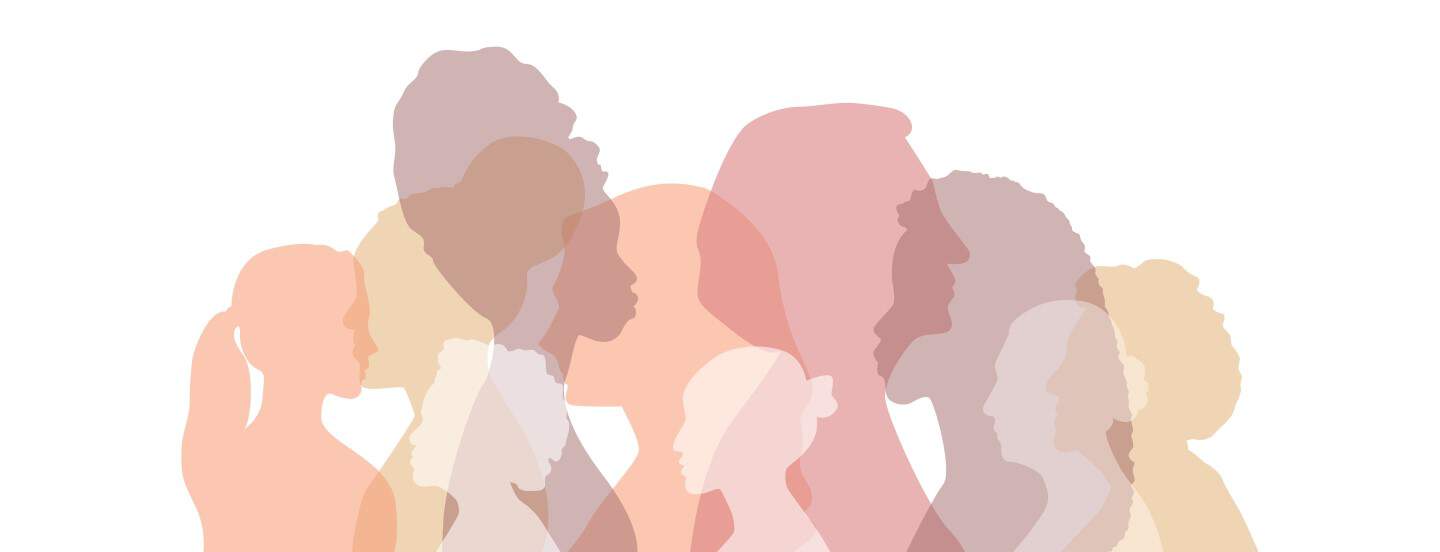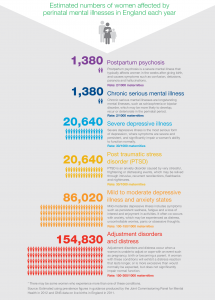
Maternal mental health matters
The Maternal Health Alliance confirm that a staggering 1 in 10 women will develop a mental illness during pregnancy or within the first year of having a baby. Many of those will struggle on in silence without recognising they need help or being able to access support.
Maternal mental health issues comes in many different shapes, sizes and forms meaning it is not always easy to spot or to realise you have been affected. Maternal mental health is not just about the most common ‘labelled’ conditions and involves other symptoms such as anxiety, depression and insomnia. It can look and feel so very different to different people.
Inforgraphic showing estimated numbers of women affected by perinatal mental illnesses in England each year, Credit: NSPCC
Maternal mental health conditions
Maternal mental health conditions are more than the baby blues and are recognised psychiatric conditions for which treatment, support and advice can be provided, but only if they are identified – and the earlier the better in my opinion.
Post baby blues
Most of you will have heard or been warned about the ‘post baby blues’ but until it hits you like a brick wall, you won’t know what to expect. This is a very common condition that up to 80% of mothers experience and isn’t just an old wives tail, it is very real. You can be sitting there overjoyed with your new born one minute and then sobbing uncontrollably the next. Your body has just gone through some incredible changes and brought a baby into the world, you can blame your hormones going wild for this. Very mild symptoms would be expected to last around two weeks but anything more than this may be a sign of something more serious and help and guidance should be sought from a professional.
Post natal depression
Postnatal depression (PND) is the most common post natal mental health disorder women experience in the first year after having a baby. The National Childbirth Trust say that between 10% and 20% of women have depression and anxiety in pregnancy and after birth.
Post partum psychosis
Postpartum psychosis, or puerperal psychosis, is a rare but serious and potentially life-threatening mental health issue. It takes the form of severe depression or mania or both.
Post partum psychosis can appear out of the blue in women with no previous history of mental illness. If acted upon quickly it can be treated, otherwise symptoms can escalate drastically which can result in serious consequences. Symptoms vary from woman to woman but they will often experience delusions or hallucinations coupled with depression, mania or confusion.
It will more than likely be the case that the mother won’t recognise these symptoms herself, it will be those around her who should seek help and act immediately as this is considered a medical emergency.
Recognising the signs of post natal depression
The main symptoms can include:
- Continual feelings of sadness and low mood;
- Loss of enjoyment of daily life;
- Tiredness and loss of energy;
- Difficulty sleeping;
- A feeling of hopelessness;
- Feeling irritable;
- Difficulty bonding with your baby;
- Difficult thoughts of harming yourself or your baby;
- Withdrawing from contact with people;
- Change in eating habits
Reading the above list of symptoms you won’t be wrong in thinking that most of these can also arise from general lack of sleep and hormone changes after having a baby and are completely typical in life with a new born. However it is very important to notice when there is a difference and a mother or a concerned family member should trust their gut and seek some help if they feel that lack of sleep or normal life with a newborn is not the cause of these symptoms.
For many women maternal mental health conditions are worryingly under reported with many not wishing to seek treatment for fear of being made to look like a bad mum or out of embarrassment but the earlier help is sought, the easier it is to make things better.
For most women, it will be loved ones around them that will spot these signs before the mother themselves and they too shouldn’t be embarrassed about tackling it head on whilst remaining sensitive and supportive, by assisting the mother to seek help and support.
In most areas of the country, health visitors will speak with mothers about their feelings and wellbeing a few weeks after birth, and try and ascertain if they need any additional support for this common, but often little-spoken about, condition.
PND can happen with your first born, second born or even skip a baby and come completely out of the blue when you haven’t had issues before. This is important to remember and can often be a common misconception with mums questioning whether they have PND this time round because they didn’t with a previous child or children.
Obstacles to seeking help for post natal depression
Many people may assume that you can’t possibly have a maternal mental health condition unless you have gone through a difficult birth or had a hard pregnancy. This isn’t the case at all and this is why some mums may not feel that they should be seeking help as they don’t want to make a fuss. Suffering in silence can be so very damaging to a mum’s health and it is so important that mums feel like they can be heard and listened to at such a dramatically life-altering time in their lives. Maternal mental health conditions are exactly that – a health condition. Getting help takes strength and courage, and needs to be applauded and supported.
The National Childbirth Trust reports that a terrifying 30% of new mums with post natal mental health problems had never talked about it to a professional. This is often down to a sense of failure and a fear of judgement and wrongly believing social services will take your baby away.
How can we improve help for new mums?
The role of the midwife, health visitor and the GP in the early days and months is so important in spotting the signs and acting upon them. Most new mums will feel that if they admit they are feeling this way then they must be a bad mum or that they don’t love their new baby. We need to ensure that mums are not made to feel this way and openly encourage these difficult conversations.
The focus should be on the new mother as much as it is on the newborn especially in the 6 week checkups as both of their respective health’s go hand in hand. You’ve heard the adage ‘happy mum equals happy baby’ I’m sure.
Educating health professionals is vitality important in recognising maternal mental health symptoms as this will ultimately have an impact on whether and when a diagnosis is made and whether treatment is offered to a mum to give her the help she needs as early as possible.
National Childbirth Trust’s “Hidden Half” campaign
The National Childbirth Trust has launched a campaign to raise awareness of the serious lack of support received by mothers when seeking help for post natal mental health issues.
Following a survey of 1000 mothers they identified that sadly only half of these women received the help they needed.
- Nearly half hadn’t had their problem identified by a health professional and hadn’t received any treatment
- Many of these new mothers said they were too embarrassed or afraid of judgement to seek help
- 95% of mothers who had a mental health problem said that this had an impact on their ability to cope as a mother or on their family
They are suggesting a very low cost and simple solution by demanding better 6 week post natal check ups to ensure all new mothers facing these issues can get the correct help and support they need to get better.
Get your voice heard and help the NCT get the #hidden half out of hiding by finding out more about their campaign.
What other support is available to new mothers?
The NHS has put together a leaflet “New Mum Wellbeing” which aims to tell you more about the normal problems many mums experience and where to find help.
There are many charities and orgnisations out there whose aims are to support women suffering with post natal mental health conditions particularly as the taboo is starting to be lifted and more awareness raised of this important issue.
A few examples are:
Pre and Postnatal Depression Advice and Support (PANDAS):
Helpline: 0843 28 98 401 is open daily 9am to 8pm.
Email Support: info@pandasfoundation.org.uk
They are available seven days a week, 365 days a year.
#PNDHour is an online peer support group that runs every Wednesday at 8pm via the Twitter account @PNDandMe. Anyone can join in to discuss topics about antenatal and postnatal depression, such as self-care, medication and seeking help. It is run by a mum called Rosey who also blogs about her own experiences with antenatal and postnatal depression, as well as raising awareness of perinatal mental illness.
By getting help early on you will not only be helping yourself but you will be helping your baby by giving them the best version of yourself you can be. The days can seem very long and dark trying to muddle through on your own but there are people out there who can help and bring back the light to your day.
My message to all new mothers who are struggling is this:
Look after yourself mummy as you are so very important, you too were born on that special day as a new mum and even if you have done it all before, each experience and each baby is so very different and there is never any shame or guilt in recognising when you need a little extra lift or some professional help to get your mind back to how it was. You are not alone. You have got this! It might seem scary speaking to other mums about how you are feeling but I can almost guarantee you won’t be the only one feeling like this and the relief that you will feel to speak to others in the same boat is euphoric and can go a very long way to helping each other through this time.
Hannah Travis is a senior solicitor at Bolt Burdon Kemp specialising in Medical Negligence claims. If you or a loved one are concerned about the treatment you have received, contact Hannah free of charge and in confidence on 0207 288 4820 or at hannahtravis@boltburdonkemp.co.uk. Alternatively, complete this form and one of the solicitors in the Medical Negligence team will contact you. Find out more about the Medical Negligence team.
Return to the Women’s Health Hub











